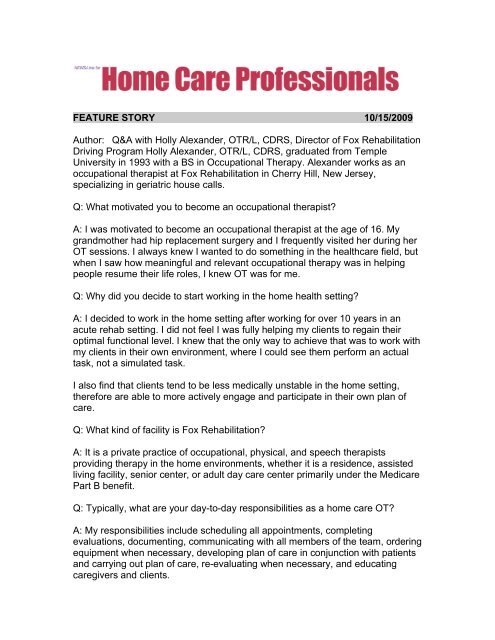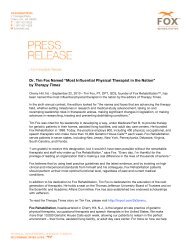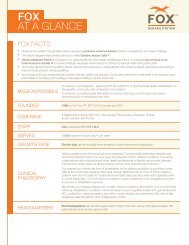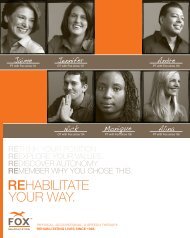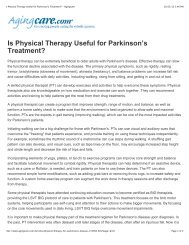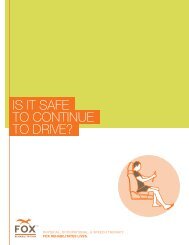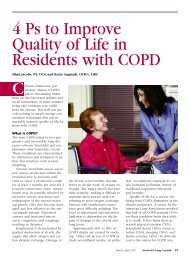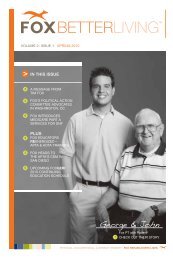Q&A with Holly Alexander, OTR/L, CDRS ... - Fox Rehabilitation
Q&A with Holly Alexander, OTR/L, CDRS ... - Fox Rehabilitation
Q&A with Holly Alexander, OTR/L, CDRS ... - Fox Rehabilitation
- No tags were found...
You also want an ePaper? Increase the reach of your titles
YUMPU automatically turns print PDFs into web optimized ePapers that Google loves.
FEATURE STORY 10/15/2009Author: Q&A <strong>with</strong> <strong>Holly</strong> <strong>Alexander</strong>, <strong>OTR</strong>/L, <strong>CDRS</strong>, Director of <strong>Fox</strong> <strong>Rehabilitation</strong>Driving Program <strong>Holly</strong> <strong>Alexander</strong>, <strong>OTR</strong>/L, <strong>CDRS</strong>, graduated from TempleUniversity in 1993 <strong>with</strong> a BS in Occupational Therapy. <strong>Alexander</strong> works as anoccupational therapist at <strong>Fox</strong> <strong>Rehabilitation</strong> in Cherry Hill, New Jersey,specializing in geriatric house calls.Q: What motivated you to become an occupational therapist?A: I was motivated to become an occupational therapist at the age of 16. Mygrandmother had hip replacement surgery and I frequently visited her during herOT sessions. I always knew I wanted to do something in the healthcare field, butwhen I saw how meaningful and relevant occupational therapy was in helpingpeople resume their life roles, I knew OT was for me.Q: Why did you decide to start working in the home health setting?A: I decided to work in the home setting after working for over 10 years in anacute rehab setting. I did not feel I was fully helping my clients to regain theiroptimal functional level. I knew that the only way to achieve that was to work <strong>with</strong>my clients in their own environment, where I could see them perform an actualtask, not a simulated task.I also find that clients tend to be less medically unstable in the home setting,therefore are able to more actively engage and participate in their own plan ofcare.Q: What kind of facility is <strong>Fox</strong> <strong>Rehabilitation</strong>?A: It is a private practice of occupational, physical, and speech therapistsproviding therapy in the home environments, whether it is a residence, assistedliving facility, senior center, or adult day care center primarily under the MedicarePart B benefit.Q: Typically, what are your day-to-day responsibilities as a home care OT?A: My responsibilities include scheduling all appointments, completingevaluations, documenting, communicating <strong>with</strong> all members of the team, orderingequipment when necessary, developing plan of care in conjunction <strong>with</strong> patientsand carrying out plan of care, re-evaluating when necessary, and educatingcaregivers and clients.
Q: What type of patients/diagnoses do you encounter most frequently?A: Dementia, debility, balance deficits, and limited ADL activity are the mostfrequent diagnoses I treat.Q: What are the greatest challenges you face in your job as a home health OT?A: The most difficult challenge is scheduling all clients effectively.Q: What do you like most about being a home health OT?A: I like the flexibility the most. I enjoy being able to treat clients in their ownenvironment to obtain the maximum benefit of therapy.Q: What do you dislike about your job?A: Sometimes communicating <strong>with</strong> all parties involved in the care of the patientcan be a challenge.Q: Do you feel that the role of OTs has changed over recent years? If so, how?A: I feel that OTs have established more respect in the medical community andare being referred to more frequently.OTs have gained more respect in the healthcare world by becoming betteradvocates for the profession. I specifically am proud of the efforts that have beenput forth in Washington, getting in front of leaders to talk about the importance ofOTs and what makes us unique and beneficial.Q: In your opinion, what is the biggest difference between focusing on homehealth, rather than another healthcare specialty?A: In home health under Medicare Part B, there is not as big of a push todischarge a patient before you feel they are at their full potential.Q: What do you feel is of the greatest concern to OTs today?A: Reimbursement issues and cuts in Medicare are concerns.Q: What is the most important thing you’ve learned thus far in your career?A: Patience and flexibility, and to appreciate all the little things.I believe it is important to appreciate the little things, because life can change inan instant. I think too many people go through life and never slow down to take a
look at all the beauty. Our society has become focused on immediate gratification<strong>with</strong>out realizing what is actually happening.I think this is part of why people become so frustrated and angry following aninjury or illness. I am thankful that occupational therapy has afforded me theinsight to appreciate how things can change and to treasure the moment.Q: What is the most rewarding part of working as a home health OT?A: The most rewarding part of working as an OT in home health is being a part ofa client getting back to do something they never thought they would be able to doagain.Q: What advice do you have for others thinking about pursuing a career in homehealth?A: Be patient, creative, and flexible. Also, you have to learn how to not passjudgment and realize sometimes you may make a recommendation that the clientdoes not carry over.You need to learn that all you can do sometimes is make a recommendation, andit is up to the client from there.Q: Are you involved in anything else as an OT?A: I am also a Certified Driving <strong>Rehabilitation</strong> Specialist. I work as the DrivingNetwork Coordinator for AOTA Physical Disabilities Special Interest Section andam the Secretary of the Northeast Chapter of the Association of Driving<strong>Rehabilitation</strong> Specialists. I am also a CarFit Instructor.I feel the best part of being a <strong>CDRS</strong> is helping the older driver stay on the roadas long as possible. Driving is a part of community mobility, which is such a hugepart of what occupational therapists do. My skills as an OT come in handyfrequently when performing evaluations on visual perception and cognition. I feellike as an OT, I have an advantage because we are so well trained to be able todecipher subtle issues <strong>with</strong> perception and cognition. As an OT, I can then takethat information and be able to develop a treatment plan to achieve the goal ofdriving.Q: What do you like about working <strong>with</strong> the geriatric population?A: I love working <strong>with</strong> the geriatric population because of their resilience. Manyolder individuals have such a great attitude about therapy and recovery. Almostlike, “I have survived so many things in my life, this illness isn’t going to get me!” Ialso love the knowledge and wisdom that many of my patients impart on me.
Q: Can you share a funny story about working <strong>with</strong> a patient?A: As an occupational therapist specializing in the area of driver rehabilitation, Iam frequently consulted to assist family and physicians determine driving abilityof the geriatric driver.Upon arriving to a 96-year-old client’s home to complete a driving evaluation, Iwas greeted by a very tall, dapper gentleman. He was very well spoken and veryamenable. While conducting my interview of his performance patterns androutines, he revealed that he drives a brand new Corvette!I was taken aback for a moment at the idea of this 96-year-old, very tall mandriving around town. My mind was racing at the prospect of him safely getting inand out of the vehicle. But, instead, I blurted out, “What color is it?” His replymakes me laugh to this day...“Red, of course, is there any other color for aCorvette?”I learned a lot that day! I was reminded that age is just a number and anindividual should not be judged based on age alone! And yes, I learned that verytall, 96-year-old men can easily get in and out of their red Corvettes!Q: Where do you see yourself in the future?A: In the future, I see myself providing more education and mentorship to OTsinterested in the area of driving rehab.Copyright ©1997-2010 NEWS-Line Communications, Inc.Read this article online at: http://www.news-line.com/featureone.lasso?-Search=Action&-token.profession=SH&-token.target=featureone&-Table=webinfo&-MaxRecords=50&-SkipRecords=0&-Database=press*&-KeyValue=1441


